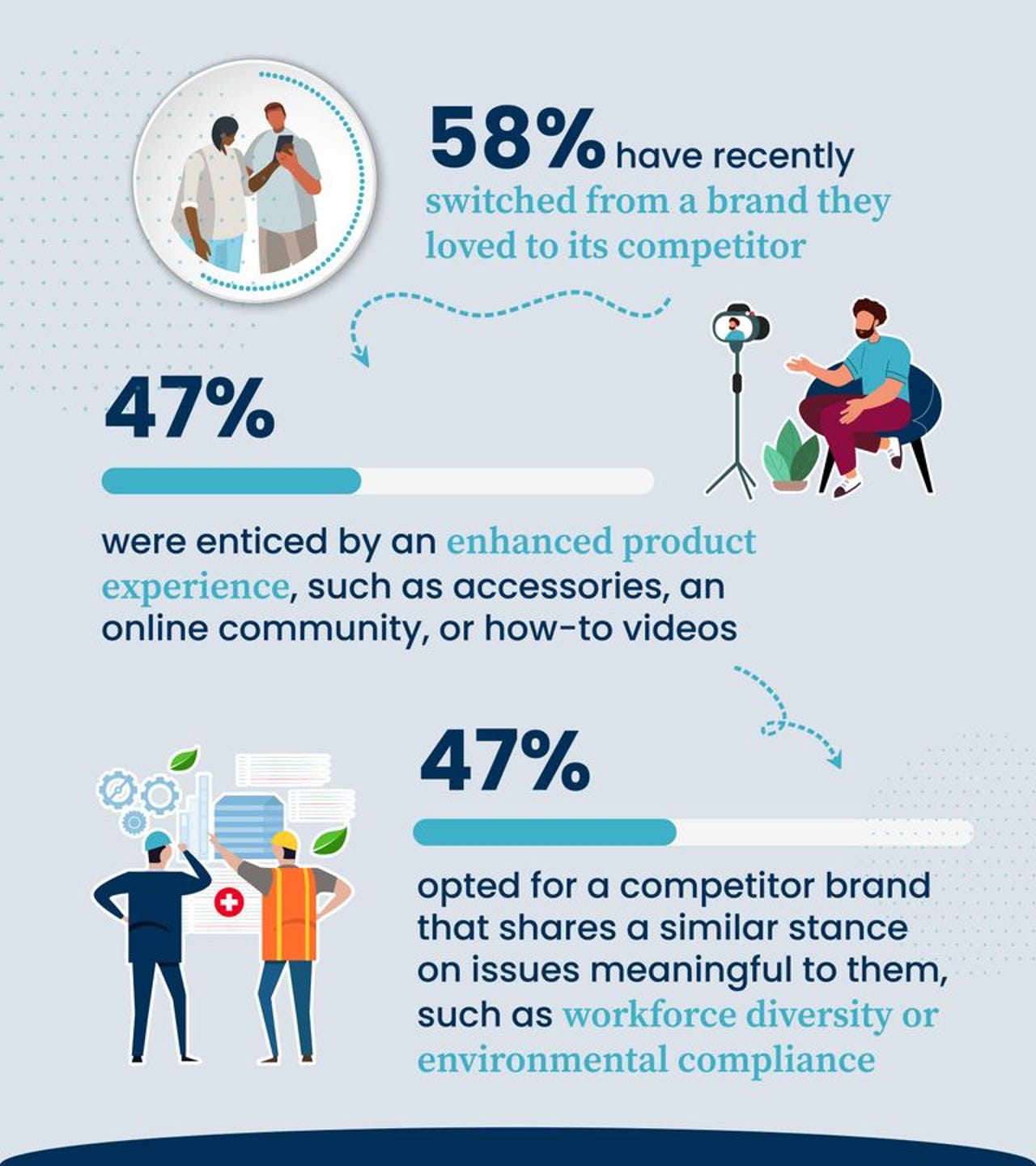































More than half of consumers -54% -said they would stop using a brand after just one bad experience. The news is worse if your target market is millennials: 57% will abandon your brand, this according to the latest research from Propel Software. The C-Suite message? There's no room for error.
Propel Software recently conducted a U.S. consumer survey to understand how consumers define brand loyalty in today's market, and the news is mixed for product companies. Consumers are likely to remain loyal to brands that continue to meet their needs, but they are also fast to switch brands to find the products and experiences they want. As with most shifts in consumer behavior, this represents both an opportunity, and a threat, to product companies.

Propel Software 2022 research: More than half of consumers have recently switched from a brand they loved to its competitor based on one bad experience.
Dario Ambrosini is chief marketing officer at Propel Software, an SaaS provider dedicated to helping high-tech, medtech, and consumer goods companies build compelling and profitable products.
Dario is the host of the Platform Rules podcast and a contributor to Converged, where he covers how market trends and technology impact product companies and manufacturers.
"Running a successful product company today is daunting. We used to encounter a major supply chain disruption every three to four years, now it seems they pop up every three to fourweeks. Amid all of the disruption -inflation, the great resignation, geopolitical instability, etc. -the consistent focus we should maintain is our relationship with the customer, who ultimately just wants a great product and experience. Companies with the right insight, collaboration, and engagement can overcome many of today's obstacles by creating the right products and compelling customer experiences. But, before they start, they need to understand the customer and what drives a purchase," said Ambrosini. Ambrosini shares the key takeaways of Propel's research on brand loyalty and changing behaviors of customer engagements.
Also: Highly skilled tech workers are becoming rare, and companies have tough decisions to make
Dario Ambrosini is chief marketing officer at Propel Software.
Dario AmbrosiniIt is hard to imagine that nearly 6 out of 10 millennials would stop using a brand after just one bad experience. Products need to create a total customer experience. It's not just about building the right product, it's about building a profitable product that is right for today's consumer, marketing it in the right channels, using compelling packaging, online product information that speaks to quality and regulatory compliance, and servicing that product appropriately. And, all this has to be done right -thefirsttime.
When Propel probed further to uncover consumers' reasons for switching brands, we found 67% willing to switch if an initial experience with a new brand is a cut above -such as offering educational resources supporting the product purchase. While 24% said inconsistent or obsolete online product information was a main reason for abandonment.
This research demonstrates that brands need to have a direct line into market and consumer trends, and respond swiftly and appropriately if they want to stay relevant in the consumers' mind.
Consumer expectations are important, and it's imperative that product companies respond appropriately and quickly when those expectations change. To learn how companies are developing products for today's consumer, Propel surveyed senior executives across product design/development and sales/marketing teams.
With market demands constantly changing, and consumers continuously expecting more from brands, companies need to be nimble enough to respond by creating profitable products that resonate with today's consumers. The good news is, some brands are. The bad news, not many. Two-thirds of respondents cited they expect brands to engage with them well after the sale, anticipate their needs, and rectify bad experiences quickly. Companies that get this right are on the fast track to gain, and retain, more customers than their slower competitors.
Wonder how successful companies master the ability to effectively respond, and proactively adapt to market needs with the right products and experiences? They don't think of business operations in silos, there is no "front office" and "back office." There is a "whole office." An office where everyone contributes to product success -from the designer, to the customer support rep, and everyone in between. This whole office strategy ensures everyone works together for the common goal of creating successful, profitable products. A whole office environment includes:
This whole office approach relies on insight, collaboration and engagement to remove data blind spots and spark enterprise collaboration, shortening product development cycles to build, market, and sell products.
Propel Software 2022 research: Two-thirds of consumers now expect brands to engage with them well after the sale, anticipate their needs, and rectify bad experiences quickly.
The research from Propel highlights the importance of data and shared insights across the entire business. "Sharing vital data and business insights across your organization will drive profitability, shore up supply chains, increase shareholder value and ultimately deliver enhanced customer experiences -while meeting corporate financial, regulatory, and sustainability goals. Companies that embrace a whole office product strategy will break down organizational barriers and create compelling customer experiences. Those that don't, will continue to fight a losing battle against tomorrow's disruptions," said Ambrosini.
This article was co-authored by Dario Ambrosini, chief marketing officer at Propel Software.
 Горячие метки:
По вопросам бизнеса
Горячие метки:
По вопросам бизнеса